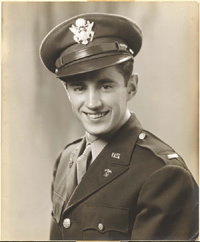| |
 |
| |
Prof.
Robert Neuschel circa WWII |
| |
|
“Serve
your troops first”
The
best leaders share power, insists Kellogg expert
Robert
Neuschel, Kellogg School professor of corporate governance
and associate dean for advisory board relations, credits the
U.S. military with his foremost leadership lesson: sharing
power is essential for success in any endeavor.
Neuschel, who
served the United States in World War II, seeing action in
both the New Guinea and Philippine campaigns in the Southwest
Pacific, recalls how different companies regularly would become
separated in combat.
“As they
get separated, the thing that’s interesting is the lieutenant
and the captain, running the company out there alone, can
function because they’ve each been taught to lead,”
he says. “This is what I call ‘unleashing the
power of your people down the line.’”
From ancient warriors
to early captains of industry, leaders have struggled with
the issue of how much power to share with others — and
how to share it gracefully, Neuschel says.
More than 60 years
later, he still remembers the words of a wise general who
told a group of newly commissioned officers — including
Neuschel — to “serve your troops first so that
you can then lead them better.”
It’s a message
the longtime leadership theorist still emphasizes to his students
today.
In the late-1940s,
when Neuschel entered the business world after the war, firms
tended to be smaller and have less complicated organizational
structures. Companies also were more likely to have one person
running the show.
Throughout a 30-year
career as a management consultant at McKinsey & Co., during
which time he worked with 65 Fortune 500 companies, Neuschel
saw more firms adopt a shared power structure.
“Back in
the early days, the leader of an organization tended to be
all-powerful and made many of the decisions,” Neuschel
says. “What has happened now is what I call ‘the
democratization of society.’ People want to rise up
— they want to grow, develop and advance. Our society
is better educated and people down the ranks know more, have
more ideas on how things should operate.”
As a
consequence, Neuschel says that the model of leadership has
changed from one where power is consolidated among a few senior
executives who tend to dominate the organization to one where
responsibility and authority are distributed among many people
in the firm.
But sharing
the power — an idea Neuschel develops in his 1998 book
The Servant Leader: Unleashing the Power of Your People
— is about more than delegating tough decisions to subordinates.
So-called servant
leaders need to be tender — and tough. They need to
have big-picture vision, but must also be capable of slogging
through gritty details to implement their plan.
Instead of making
leadership simpler, sharing decision-making power makes it
more complex, Neuschel explains.
“When more
people share leadership around the organization, the important
task is knitting it all together to make it cohesive,”
he says. “There’s got to be an overall strategy
laid out.”
—
Kari Richardson
|



